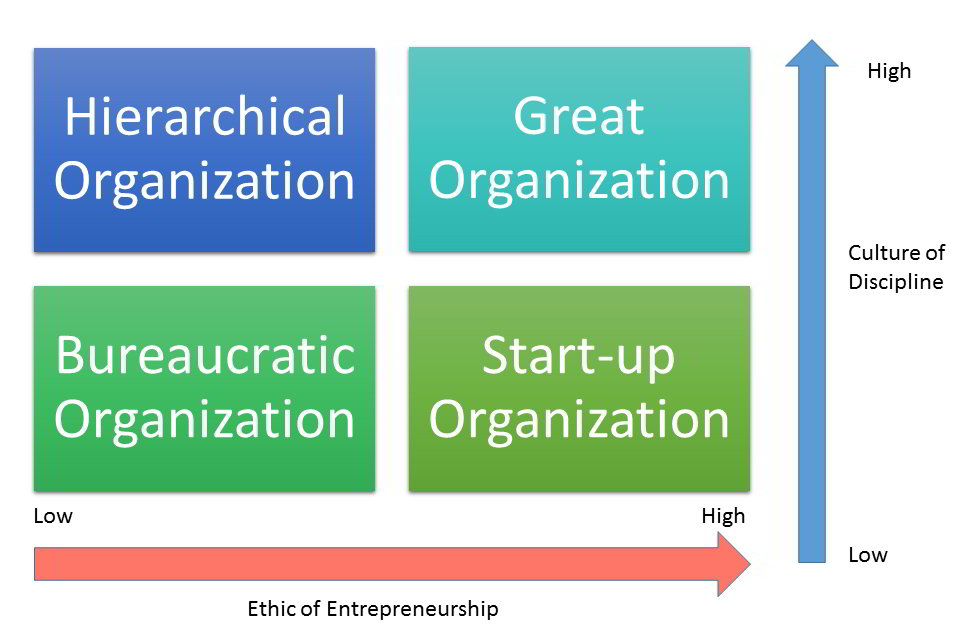Good to Great: A Culture of Discipline

In this section of his book, Jim Collins focuses around the discipline of an organization. You can only form a disciplined foundation if you have the right people on the bus, who are themselves self-disciplined. Applying this over time you will be able to cement this as the company culture.
The Bureaucratic Death Spiral
The purpose of bureaucracy is to compensate for incompetence and lack of discipline - a problem that largely goes away if you have the right people in the first place
In most cases bureaucracy is created to compensate for the small amount of wrong people on the bus, whom typically are incompetent or lack discipline. In order to cater for these small percentage of individuals, rules are put in place to manage them. These rules then tend to drive away the right people on the bus as they feel that they are unnecessary and slow down progress. In order to fill the positions of the people leaving, what tends to happen is that more wrong people are taken onto the bus, which causes more rules to be implemented which in turn causes more of the right people to leave. So the cycle continues until the company has become completely hierarchical and bureaucratic.
An alternative approach this hierarchy and bureaucracy is to create a culture of discipline with the ethic of entrepreneurship. In doing this you end up with a great company.

So how do you go about doing this? Jim Collins describes the following steps which you can take to ensure that you become a great company:
- Build a culture of freedom and responsibility, but within a framework
- Ensure that you get the right, self-disciplined people on the bus who will make sure that they will achieve their responsibilities
- Don't become a tyrant in creating a culture of discipline. You shouldn't be a Level 4 leader leading by force. Even though the company may succeed while under that sort of leadership, as soon as they leave, things tend to fall apart.
- Apply extreme focus on adhering to your Hedgehog Concept and create a stop doing list. If it doesn't fit with your Hedgehog Concept, then you stop doing it. If you lack the discipline to stay with in the three circles, the company will tend to fail. It takes discipline to say no to something, even if it is a "once-in-a-lifetime" opportunity. If it doesn't fit within the concept, then it should be discarded.
Freedom in a Framework
In the first point above, Jim Collins mentions allowing freedom within a framework. To put this in a real world example lets take the example of airplane pilots. They work in a framework where they are guided by air traffic control and told when they can leave, what gate they should taxi etc and alwasy remain in contact with air traffic control to ensure that they remain within the strict boundaries of flight travel.
However, within these boundaries, the pilots are given ultimate responsibility to decide what is best for the passengers. For example, they are allowed to decide whether or not they will make a landing, and if not take off again. Air traffic control doesn't dictate to them what they should do in those circumstances. In effect, this allows them to use their own discretion to decide how to operate within the system.
In a business context, this would translate to hiring self-disciplined people who can operate within a framework. In doing this, you will not have to manage the people, but just maintain the system that is place, which frees you from certain tasks.
Discipline, Discipline, Discipline
In essence, all of this boils down into being disciplined in three main areas:
-
Disciplined People
You don't want to have the wrong people in the bus and have to discipline them so you can exhibit the right behaviours. Instead, you want to get self-disciplined people on the bus, so you don't have to manage them as much. -
Disciplined Thought
This relates to a previous post on confronting the brutal facts. In doing this, you understand what actions need to be taken in order to achieve your Hedgehog Conceptand you need to stick to it unrelentingly! -
Disciplined Action
Often, the good companies tried to just jump straight to this step without going through the previous steps first. Without the previous steps, disciplined action will be almost impossible to maintain and will ultimately set yourself up for disaster!
"Rising Your Own Cottage Cheese"
The story of rinsing your own cottage cheese comes from the first six-time Ironman Triathlon, Dave Scott. Even through he burned up 5,000 calories a day, he would show great discipline to by rinsing his cottage cheese to get as much fat off as possible. Now you may think to yourself, *"Who would actually go to such lengths?", well, to answer your question, it would be people who want to be the best.
If we project this concept into the business world, it would be something like removing the executive luxuries such as personal canteens, executive elevators, fancy boardrooms and all sorts of fancy perks. By doing this, you cut off the excess "fat" which in all honesty, isn't really necessary. Often employees "suffer" while the executives live the high life. Interestingly, when things start going south for a company, the executives often find it very difficult to get rid of these luxuries and try to cling on to them for as long as possible.
Budgeting Season
An interesting thing that I found was that in a great company budgeting wasn't used to decide what portion of the money should go to the various departments, or on how to manage the costs. Instead, it was used to decide which areas of the company should be fully funded, and which area shouldn't be funded at all. In doing this, they were able to determine which areas of the organization where in alignment with supporting the Hedgehog Concept, and which ones should be removed completely.
In Summary
In order to achieve, and maintain, great results, you need to create a culture of discipline, by getting the right people on the bus. You want to avoid bureaucracy that tends to drive the right people off the bus, but instead create a framework where people are free to move within.
Until next time...keep learning!`